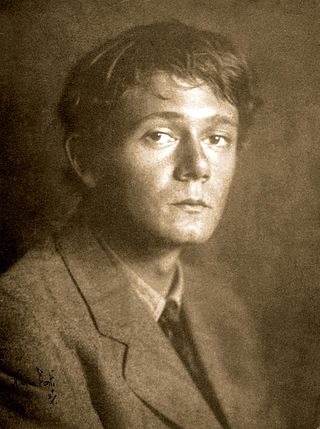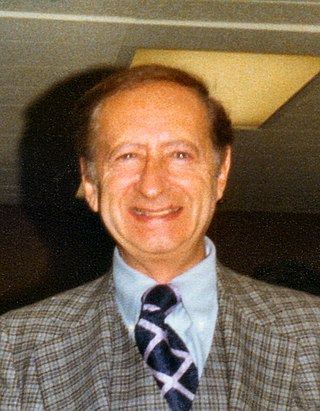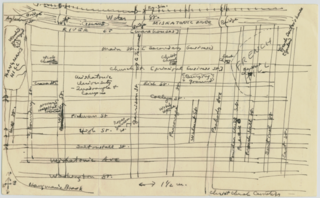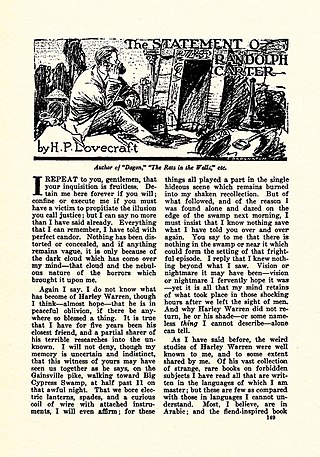Related Research Articles

The Cthulhu Mythos is a mythopoeia and a shared fictional universe, originating in the works of American horror writer H. P. Lovecraft. The term was coined by August Derleth, a contemporary correspondent and protégé of Lovecraft, to identify the settings, tropes, and lore that were employed by Lovecraft and his literary successors. The name "Cthulhu" derives from the central creature in Lovecraft's seminal short story "The Call of Cthulhu", first published in the pulp magazine Weird Tales in 1928.

Clark Ashton Smith was an American writer and artist. He achieved early local recognition, largely through the enthusiasm of George Sterling, for traditional verse in the vein of Swinburne. As a poet, Smith is grouped with the West Coast Romantics alongside Joaquin Miller, Sterling, and Nora May French and remembered as "The Last of the Great Romantics" and "The Bard of Auburn". Smith's work was praised by his contemporaries. H. P. Lovecraft stated that "in sheer daemonic strangeness and fertility of conception, Clark Ashton Smith is perhaps unexcelled", and Ray Bradbury said that Smith "filled my mind with incredible worlds, impossibly beautiful cities, and still more fantastic creatures".

Robert Albert Bloch was an American fiction writer, primarily of crime, psychological horror and fantasy, much of which has been dramatized for radio, cinema and television. He also wrote a relatively small amount of science fiction. His writing career lasted 60 years, including more than 30 years in television and film. He began his professional writing career immediately after graduation from high school, aged 17. Best known as the writer of Psycho (1959), the basis for the film of the same name by Alfred Hitchcock, Bloch wrote hundreds of short stories and over 30 novels. He was a protégé of H. P. Lovecraft, who was the first to seriously encourage his talent. However, while he started emulating Lovecraft and his brand of cosmic horror, he later specialized in crime and horror stories working with a more psychological approach.

Arthur Machen was the pen-name of Arthur Llewellyn Jones, a Welsh author and mystic of the 1890s and early 20th century. He is best known for his influential supernatural, fantasy, and horror fiction. His novella The Great God Pan has garnered a reputation as a classic of horror, with Stephen King describing it as "Maybe the best [horror story] in the English language." He is also well known for "The Bowmen", a short story that was widely read as fact, creating the legend of the Angels of Mons.

Arkham is a fictional city situated in Massachusetts, United States. An integral part of the Lovecraft Country setting created by H. P. Lovecraft, Arkham is featured in many of his stories and those of other Cthulhu Mythos writers.

Ramsey Campbell is an English horror fiction writer, editor and critic who has been writing for well over fifty years. He is the author of over 30 novels and hundreds of short stories, many of them winners of literary awards. Three of his novels have been adapted into films.

William Joseph Martin, formerly Poppy Z. Brite, is an American author. He initially achieved fame in the gothic horror genre of literature in the early 1990s by publishing a string of successful novels and short story collections. He is best known for his novels Lost Souls (1992), Drawing Blood (1993), and Exquisite Corpse (1996). His later work moved into the genre of dark comedy, with many stories set in the New Orleans restaurant world. Martin's novels are typically standalone books but may feature recurring characters from previous novels and short stories. Much of his work features openly bisexual and gay characters.

Peter Francis Straub was an American novelist and poet. He had success with several horror and supernatural fiction novels, among them Julia (1975), Ghost Story (1979) and The Talisman (1984), the latter co-written with Stephen King. He explored the mystery genre with the Blue Rose trilogy, consisting of Koko (1988), Mystery (1990) and The Throat (1993). He fused the supernatural with crime fiction in Lost Boy, Lost Girl (2003) and the related In the Night Room (2004). For the Library of America, he edited the volume H. P. Lovecraft: Tales and the anthology American Fantastic Tales. Straub received such literary honors as the Bram Stoker Award, World Fantasy Award, and International Horror Guild Award.

Michael Shea was an American fantasy, horror, and science fiction author. His novel Nifft the Lean won the World Fantasy Award, as did his novella Growlimb.
Weird fiction is a subgenre of speculative fiction originating in the late 19th and early 20th centuries. Weird fiction either eschews or radically reinterprets traditional antagonists of supernatural horror fiction, such as ghosts, vampires, and werewolves. Writers on the subject of weird fiction, such as China Miéville, sometimes use "the tentacle" to represent this type of writing. The tentacle is a limb-type absent from most of the monsters of European folklore and gothic fiction, but often attached to the monstrous creatures created by weird fiction writers, such as William Hope Hodgson, M. R. James, Clark Ashton Smith, and H. P. Lovecraft.

Frank Belknap Long Jr. was an American writer of horror fiction, fantasy, science fiction, poetry, gothic romance, comic books, and non-fiction. Though his writing career spanned seven decades, he is best known for his horror and science fiction short stories, including contributions to the Cthulhu Mythos alongside his friend, H. P. Lovecraft. During his life, Long received the World Fantasy Award for Life Achievement, the Bram Stoker Award for Lifetime Achievement, and the First Fandom Hall of Fame Award (1977).

"The Statement of Randolph Carter" is a short story by American writer H. P. Lovecraft. Written in December 1919, it was first published in The Vagrant, May 1920. It tells of a traumatic event in the life of Randolph Carter, a student of the occult loosely representing Lovecraft himself. It is the first story in which Carter appears. Its adaptations include the film The Unnamable II: The Statement of Randolph Carter.

"The Outsider" is a short story by American horror writer H. P. Lovecraft. Written between March and August 1921, it was first published in Weird Tales, April 1926. In this work, a mysterious individual who has been living alone in a castle for as long as he can remember decides to break free in search of human contact and light. "The Outsider" is one of Lovecraft's most commonly reprinted works and is also one of the most popular stories ever to be published in Weird Tales.

Donald Albert Wandrei was an American science fiction, fantasy and weird fiction writer, poet and editor. He was the older brother of science fiction writer and artist Howard Wandrei. He had fourteen stories in Weird Tales, another sixteen in Astounding Stories, plus a few in other magazines including Esquire. Wandrei was the co-founder of the prestigious fantasy/horror publishing house Arkham House.
Joseph Payne Brennan was an American writer of fantasy and horror fiction, and also a poet. Of Irish ancestry, he was born in Bridgeport, Connecticut and he lived most of his life in New Haven, Connecticut, and worked as an Acquisitions Assistant at the Sterling Memorial Library of Yale University for over 40 years. Brennan published several hundred short stories, two novellas and reputedly thousands of poems. His stories appeared in over 200 anthologies and have been translated into German, French, Dutch, Italian and Spanish. He was an early bibliographer of the work of H. P. Lovecraft.

Edgar Hoffmann Trooper Price was an American writer of popular fiction for the pulp magazine marketplace. He collaborated with H. P. Lovecraft on "Through the Gates of the Silver Key".
"The White People" is a horror short story by Welsh author Arthur Machen. Written in the late 1890s, it was first published in 1904 in Horlick's Magazine, edited by Machen's friend A. E. Waite, then reprinted in Machen's collection The House of Souls (1906).

Joseph S. Pulver Sr. was an author and poet, much of whose work falls within the horror fiction, noir fiction / hardboiled, and dark fantasy genres. He lived in Germany, and died from COPD and other issues in a German hospital on April 24, 2020.

Jason Vincent Brock is an American author, artist, editor and filmmaker.
References
- ↑ S.T. Joshi, The Modern Weird Tale, 2001, (p. 114)
- 1 2 3 4 Douglas E. Winter, "T. E. D. Klein" in: D. E. Winter, Faces of Fear. New York: Berkley, 1985. (pp.122–135). ISBN 0-425-07670-9
- ↑ Library of America. "American Fantastic Tales: Terror and the Uncanny from Poe to Now (boxed set)" . Retrieved March 18, 2018.
- ↑ The New Lovecraft Collector 9 (Winter 1995), 3
- ↑ Steven J. Mariconda, "The Hints and Portents of T. E. D. Klein", in Studies in Weird Fiction No. 1: 19–28. Summer 1986.
- ↑ Robert M. Price, "T. E. D. Klein", in Darrell Schweitzer, ed. Discovering Modern Horror Fiction I. Mercer Island: Starmont, 1985. (pp. 68–85).
- ↑ "The Ceremonies [Trade Paperback] by T.E.D. Klein" . Retrieved March 19, 2018.
- ↑ World Fantasy Convention. "Award Winners and Nominees". Archived from the original on December 1, 2010. Retrieved February 4, 2011.
- ↑ World Horror Convention. "Announcements" . Retrieved March 18, 2018.
- ↑ ""Summary Bibliography: T. E. D. Klein"". Internet Speculative Fiction Database.
- ↑ Robert Lee Bolton III, " "Collected Writings From a Master of the Horror Genre" . Retrieved April 15, 2020.", April 7, 2020